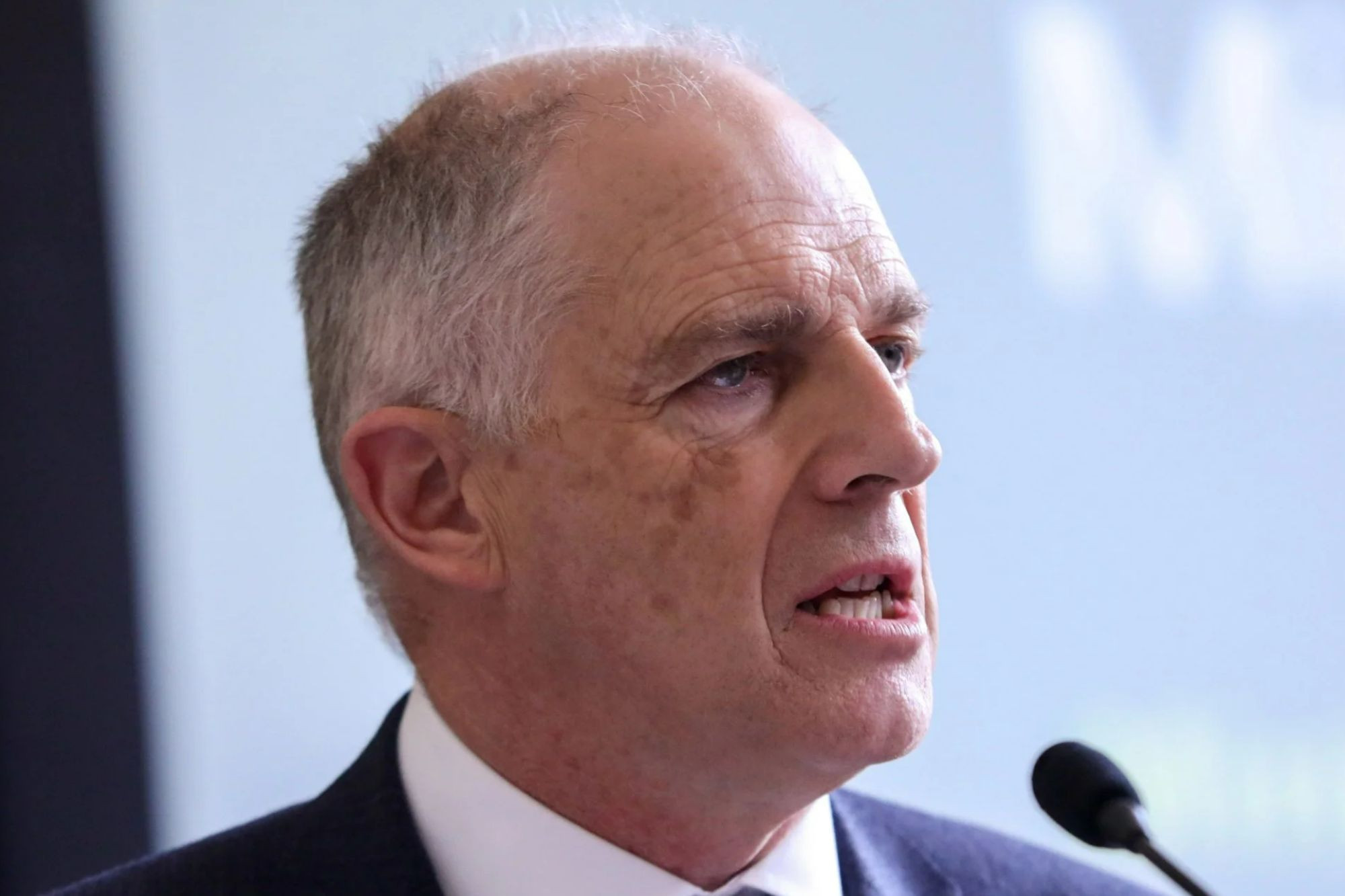Massive Attack helped redefine British music in the 1990s. Now the seminal Bristol band are trying to change the music industry's record on climate action, which they say has been stuck for too long.
Massive Attack hope their fans won't notice much unusual about their mini-festival this weekend - their first show in their home city for five years.
“If it goes according to plan, it will just feel like a normal gig to most people,” band member Robert Del Naja says.
“No-one will know the difference. They will come to the gig, it will rain, there will be great music, it will be a visual spectacle, they'll leave and they’re happy.”
Fans might spot a few changes from other gigs, though.
All the food will be vegan. All the loos will be compostable. If they're really observant, people might spot (electric) vans containing large batteries occasionally recharging other large batteries around the site, instead of having diesel generators to power the stage and stalls.
Perhaps the biggest difference will not be in the show but outside. There's no car park.
Instead, the 34,000 attendees are strongly encouraged to walk, cycle or get public transport - including on one of five special trains laid on to take people back across the south-west at the end of the bank holiday Sunday night.
Massive Attack say the one-day show will be the lowest-carbon concert of its scale ever held, and want it to provide a template for the rest of the live music industry to follow.
“This experiment, by its very virtue of being here, is hopefully going to create some activity,” Del Naja says. “And it's a sector which has a lot to say about climate change, but unfortunately it's not doing much about it.”
In the 90s, Massive Attack led a wave of delirious downbeat dance music dubbed trip-hop, with hits like Unfinished Sympathy and Teardrop. Back then, few people gave serious thought to the environmental impact of touring.
“We're very aware of the polluting we've done, which is why we're doing this.”
Del Naja, also known as 3D, is the driving force behind the group’s drive to be as sustainable as possible. Bandmate Grant Marshall, or Daddy G, is fully on board too.
Why do they feel so strongly? “It’s simple,” Marshall says. “It's because there's only one planet, and we've got to try and save it.
“Everybody knows what's going on, and if we can do our bit to try and save something for the future, then it seems like a no brainer.”
The Bristol concert comes five years after Massive Attack commissioned the Tyndall Centre for Climate Change Research to write a report setting out a roadmap for “super low carbon live music”. They are now attempting to put as much of that as possible into practice.
Other measures being taken include:
“It's been five years and no-one’s shown much interest,” Del Naja says. “A couple of bands, a couple of promoters, but very little interest.
“In fact, most other promoters say 'we've got our own report', which is slightly ridiculous because those reports are written by their own team. So that's been really quite frustrating.
“The other frustration is that there's a whole cluster of NGOs [non-governmental organisations] that have been built over the last 10 years that take a lot of public money to talk about how they may reduce emissions in the future, and to do impact reports. We've already done an impact report. It's publicly available.
“You don't need to do another impact report. We don't need any more pledging. We don't need to take more public money to do this. It already exists. The best thing to do is put it into action. So I find that frustrating.
“But it also means that the sector itself, and particularly the most powerful agents in the sector, the big promoters, don't get to do anything. They can just keep parking it - another five years, another five years, while we write another impact report.
“So we've tried to bypass that, leap over it all and just put it as much into action as we possibly can.”
Other bands have been taking action. Coldplay have said their 12-step plan - including eye-catching initiatives like a kinetic dancefloor and electricity-generating bicycles - cut the carbon emissions of their last world tour by 59%.
Massive Attack say they have found ways to cut emissions on their current European tour, as well as for the one-off Bristol show.
They have cut down on equipment so they take two trucks on the road instead of the previous six. “And we're traveling by train as much as we can across Europe,” Del Naja says.
“That's the bit we're trying to do ourselves. And every festival we go to, we try to encourage the promoters to look at the technology we've employed and we show them the Tyndall report.”
Even before commissioning that research, they were asking promoters to make changes to cut emissions – such as the last time they headlined a mini-festival on Bristol's Clifton Down, eight years ago.
“We had our arguments then,” Del Naja says, but they were met by “that fear of the bottom line being affected by every decision you make”.
“It hasn’t been so difficult this time,” he says.
They have now got others on board, like transport and power firms. GWR is laying on the extra late-night trains, and Ecotricity is supplying 100% renewable electricity to the site through the batteries.
“I think the only time we’ll know it’s worked is when we walk off stage and there's been no power cuts in between,” Del Naja says.
“That's going to be the moment I'm waiting for. We bow off stage, lights out, great, no interruptions.”
More research will be compiled afterwards about what worked and what didn’t, which Del Naja hopes will be “transformational” for the industry.
The show is pioneering for the way it is trying to combine a wide range of environmentally-friendly measures, according to Adam Corner, a Bristol-based writer and researcher on climate and culture.
Many of the technologies and techniques have been tried out by other festivals and events. Some, like putting on special late trains, are more unusual.
“It showcases what's possible, because there’s been a little bit of commentary from people saying, well it's great they're doing it, but can you replicate it for other shows?” he says.
Many people in the music and creative industries agree that things could and should be improved - and some artists and organisers and bodies have been trying for years - but progress has been slow, he says.
“Other industries have got clearer plans and central targets, so you can see progress being made. Whereas, I think with lots of individual [music] events and acts, it's been slower for all this to come together and be co-ordinated.
“So the more that we can see all the pieces of the puzzle in place, and what that looks like, it really does help show other events what's possible - without necessarily assuming that everyone can do all of it straight away.
“Someone needs to go first in putting all of the pieces of the puzzle together.”
Act 1.5: A Climate Action Accelerator Concert
As the group prepare for Act 1.5, a Bristol festival aiming to have the lowest emissions of any big music event, Robert Del Naja says decarbonised touring is possible
As pop stars fly on private jets and haul stage sets around the world, with their fans collectively generating significant emissions via their own travel to gigs, Massive Attack’s Robert Del Naja has said “it’s time to act” and address the environmental damage wreaked by live music.
A home town Bristol show on Sunday, titled Act 1.5 – a reference to the 2015 UN climate treaty that asked countries to keep global heating to under a 1.5C threshold – will be 100% powered by renewable energy, in what the band say is a “world first” for an event of its scale. Thirty thousand fans will attend the one-day festival, which also features the US rapper Killer Mike, the Irish folk group Lankum and the actor Samantha Morton’s solo music.
Del Naja describes Act 1.5 as a “climate action accelerator”, adding: “Some people think the whole point of our sector is to tell people about [the climate crisis], as if it’s not one of the most widely reported issues globally of our time. We don’t need to talk about it – we need to act on it.”
The environmentally minded show was conceived in 2018, and announced in 2021 – a scheduled performance in Liverpool was pulled owing to the venue’s links to an arms fair. Then rearranged plans were shelved because of ill-health in the band.
“It’s been a long journey; I was a young man once,” jokes the show’s lead producer, Mark Donne. He detected in Massive Attack an “intense frustration with their sector”, which had, he claims, “a sort of intransigent attitude to anything other than the decorative or superficial. Our plans became practical very quickly.”
Massive Attack, who formed in 1988 and defined the UK’s trip-hop scene with hits such as Unfinished Sympathy and Teardrop, commissioned a report by the decarbonisation specialists Tyndall Centre for Climate Change Research, which the group shared as a publicly available roadmap to super-low carbon live music.
The Act 1.5 festival is enacting the recommendations of the report, and will address the key emissions areas of transport, food, energy and waste. As the travel of concertgoers makes up the highest proportion of an event’s emissions, local people were prioritised with presale access to tickets, and free electric shuttles will serve transport hubs – intentionally, there is no car park. Ticket holders have been incentivised to travel by train – some specially chartered for the show – with a VIP (“very important process”) bar and toilets.
The band’s own travel setup has been massively slimmed down. “At blueprint level it was: how do we design an exciting show that doesn’t take 25 trucks to move from place to place?” Del Naja says. “Now our haulage is down to two trucks, and I feel the show is more confrontational, provocative and visually dynamic. It hasn’t lost anything – it’s gained more.” Made with the documentary film-maker Adam Curtis and the lighting/staging collective United Visual Artists, the band have billed the show as “a transgressive leap” from their earlier work with those collaborators.
Unlike many other outdoor shows of its size, stages will not be powered by diesel generators, but by huge rechargeable batteries. “I’d like to think that next year all the big stages at all the big festivals will be powered by batteries, because that’s the look,” Del Naja says.
Vendors on site – many from local postcodes – will sell only plant-based food and bars are encouraging fans to bring their own reusable cups. No waste from the festival will go to landfill, and a new woodland of 19,000 native oak trees will be planted 40 miles from the festival site.
A Blueprint for the Music Industry
Massive Attack are not the only artists addressing the emissions of their touring. By Billie Eilish’s request, the O2 Arena in London only served vegan food during the singer’s 2022 residency, and she has announced an array of climate actions for her next tour. In June, Coldplay reported that a 12-point sustainability plan had led to a 59% reduction in carbon emissions compared with their previous global tour.
“It’s important to keep reminding ourselves … you can tour, and you can travel by train when you can,” says Del Naja.
Local and national government may have their own role to play in future – in order to get a licence a UK festival has to work within a framework set out by the local authority, and those instructions could include conditions around renewable power or greener transport.
However, Del Naja says concert promoters should not wait for regional, national or international authorities to update their policies – and therefore be told what to do on emissions. He argues the technology and strategies to decarbonise a live music event are already available, and should be utilised.
“This isn’t us trying to point the finger at the consumer,” he says. “It’s more about the promoters, who hold the power in this sector, who need to do more. They have the ability to make the change; the finances. What’s frustrating is knowing that people are sitting there on their hands, waiting for legislation to happen.”
Donne insists Act 1.5 will be profitable, and hopes it will be an exemplar to the rest of the music industry, even as an experiment. “We’ll be transparent; record where things didn’t work,” he says. “[This is about] showing how far you can move quickly – if you choose to.” Del Naja says it will inform what Massive Attack themselves “can do working with other promoters domestically and abroad”.
Act 1.5 Stage Times
Details of the homecoming gig were first shared in December, when the trip-hop collective confirmed that 2024 would see them perform at an all-day “large-scale climate action accelerator event” – celebrating 25 years of climate activism for the band.
The likes of Killer Mike, Lankum, Sam Morton and the Wild Bunch’s DJ Milo are also set to perform at the gig, and you can click here to find any remaining tickets.
Now, just over a week before the performances kick off, the band have shared the stage times for the event. With live sets beginning at 2pm.
DJ Milo will take to the stage first and hold an hour-long set between 2pm and 3pm, followed by a 15-minute interval before Sam Morton plays between 3:15pm and 4pm. From there, the Mercury Prize-nominated Irish group will play between 4:40pm and 5:40pm, followed by Killer Mike, whose set will be between 6:25pm and 7:25pm.
Finally, Massive Attack will round off the night with their huge headline set that comes in just shy of two hours long. This will see them take to the Bristol stage at 8:25pm and finish at 10:15pm.
Guest speakers and DJ sets from DJ Milo will also continue throughout the day.
A Gig Like No Other
Writing on Instagram, the group said Act 1.5 “may be the last time we play Bristol” – though Del Naja isn’t quite as emphatic today. “There’s a sense that once we’ve done this we probably won’t work on this scale again in this city,” he says. “It’s the big one for us, and whatever we do next will be different.”


















